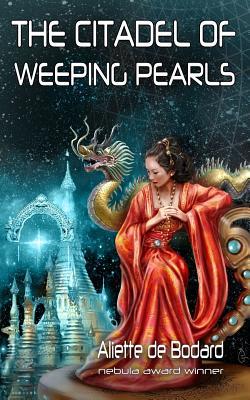 The Citadel of Weeping Pearls (Xuya Universe) by Aliette de Bodard
The Citadel of Weeping Pearls (Xuya Universe) by Aliette de Bodard Format: ebook
Source: purchased from Amazon
Formats available: paperback, ebook
Genres: science fiction, science fiction mystery, space opera
Series: Universe of Xuya
Pages: 164
Published by Jabberwocky Literary Agency on September 12, 2015
Purchasing Info: Author's Website, Publisher's Website, Amazon, Barnes & Noble, Kobo, Bookshop.org, Better World Books
Goodreads
The Citadel of Weeping Pearls was a great wonder; a perfect meld between cutting edge technology and esoteric sciences-its inhabitants capable of teleporting themselves anywhere, its weapons small and undetectable and deadly. Thirty years ago, threatened by an invading fleet from the Dai Viet Empire, the Citadel disappeared and was never seen again. But now the Dai Viet Empire itself is under siege, on the verge of a war against an enemy that turns their own mindships against them; and the Empress, who once gave the order to raze the Citadel, is in desperate needs of its weapons. Meanwhile, on a small isolated space station, an engineer obsessed with the past works on a machine that will send her thirty years back, to the height of the Citadel's power. But the Citadel's disappearance still extends chains of grief and regrets all the way into the fraught atmosphere of the Imperial Court; and this casual summoning of the past might have world-shattering consequences... A new book set in the award-winning, critically acclaimed Xuya universe.
My Review:
I wasn’t expecting to go down the “wibbly wobbly, timey wimey” rabbit hole again after yesterday’s book, but here we are all the same. Only further back and further forward, with MUCH bigger consequences, even though the motives for the time travel are every single bit as personal and emotional as they were in before.
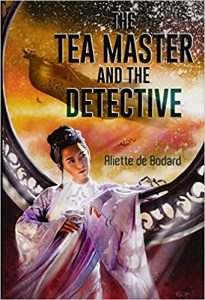 I’ve been nibbling at the vast, sprawling Universe of Xuya ever since I read The Tea Master and the Detective and fell hard for the way that the author dips in and out of a vast history and galaxy-spanning empire that takes root in a version of Earth’s history that simply managed to go down a different leg of the trousers of time.
I’ve been nibbling at the vast, sprawling Universe of Xuya ever since I read The Tea Master and the Detective and fell hard for the way that the author dips in and out of a vast history and galaxy-spanning empire that takes root in a version of Earth’s history that simply managed to go down a different leg of the trousers of time.
If China founded a colony on the west coast of North America in the 15th century and started growing both eastwards and southwards, shoring up the Aztec, Maya and Incan regimes in Central and South America, bringing the scourge of smallpox to the continent early enough that immunity has developed before the conquistadors and the pilgrims invaded, the world changes. A lot.
As with all alternate history SF, once the butterfly has flapped its wings in a different direction, the changes ripple out in all directions, resulting in the universe we find in this amazing saga. A universe where human expansion from Earth is based on Chinese and Viet traditions – because they became different types of world powers than they did – or did not – in our history. (The author goes into the history and how it changed in quite a bit of helpful and fascinating detail on her website. An explanation I’ve been staring at for several days that probably had more than a little bit to do with my picking this book up now instead of the other things I had planned.)
But human is as human does, which ties back to those “wibbly wobbly, timey wimey bits” and the all too human regrets of an Empress who faces the threat of war and wishes she had not exiled her brilliant, untraditional, defiant heir many years ago, a daughter who has carried on sailing the same sea of regrets and recriminations, and a young girl grown up without the mother who was lost in that same explosion of fear, love and war.
In this SFnal universe, however, lost does not necessarily mean dead, and advanced engineering makes entirely too many things possible – including some that it quite possibly should not. Like time travel, even if, as in yesterday’s book, it’s not possible to change the past – only to visit.
And perhaps, just a little bit more.
Escape Rating A-: The more times I dip into this series and to the author’s work in general, the more I realize that all her stories are SF mysteries to some extent, and that most of them were published ahead of the current trend for that fascinating blend.
In Citadel, the mystery begins when a famed scientist and engineer disappears just as she is getting results in her greatest and most speculative experiment. She was searching for the Empress’ heir, Bright Princess Ngoc Minh, who disappeared into deep time, or the space between the stars, or somewhere believed to be utterly mythical – and took her entire rebellious colony of ships and orbital stations, collectively known as the Citadel of Weeping Pearls, along with everyone aboard them with her wherever it is she went.
With war on the horizon, the Empress needs her daughter’s genius and the weapons and technologies it created. But the promising trail has winked out of existence along with the missing engineer, only to reappear in the hands of a pair of amateurs on a far distant orbital station.
A station that seems to be in the process of going to join the Citadel though a time portal – with someone trapped on the other side.
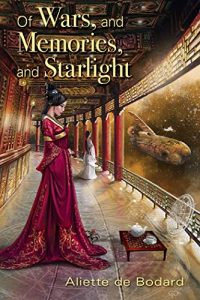 But nothing is quite as it seems, as the possibility of going back and bringing the Citadel forward forces everyone who has been touched by its disappearance to rethink what they did then, what they’ve felt in the absence of the shooting star that is/was Bright Princess Ngoc Minh, and what they might do with a second chance.
But nothing is quite as it seems, as the possibility of going back and bringing the Citadel forward forces everyone who has been touched by its disappearance to rethink what they did then, what they’ve felt in the absence of the shooting star that is/was Bright Princess Ngoc Minh, and what they might do with a second chance.
Whether that’s a chance for closure, a chance to say goodbye, the possibility of reconciliation or the question of whether a miracle will be enough to save an empire rests in the minds, and the hearts, of every compelling character in this glimpse into the workings of the Universe of Xuya.
I’ll certainly be back the next time I have a flail and bail week like this one. Either with On a Red Station, Drifting which looks like it might be a bit of a direct prequel to The Citadel of Weeping Pearls, or Of Wars, and Memories, and Starlight because it gathers together so many of the early stories in the series that were published in a scattered array over the years.

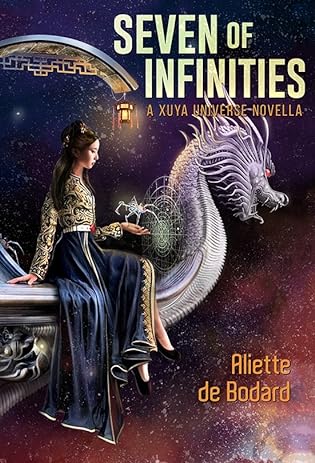 Seven of Infinities by
Seven of Infinities by 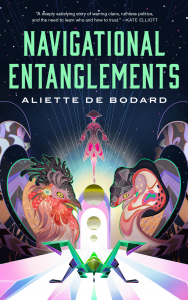 In the
In the 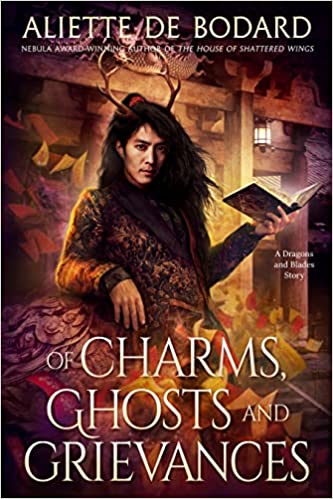 Of Charms, Ghosts and Grievances (Dragons and Blades #2) by
Of Charms, Ghosts and Grievances (Dragons and Blades #2) by  Escape Rating A-: As I said I still haven’t read
Escape Rating A-: As I said I still haven’t read 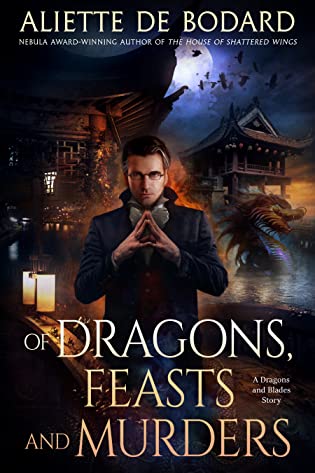 Of Dragons, Feasts and Murders (Dragons and Blades, #1) by
Of Dragons, Feasts and Murders (Dragons and Blades, #1) by 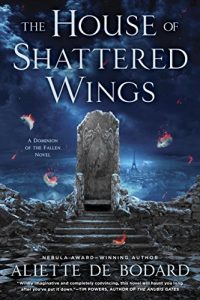 Little did I know that
Little did I know that 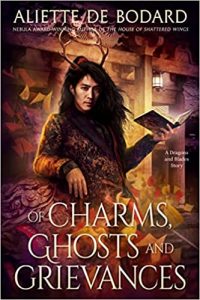 So it has the appeal of a mystery in that there’s a dead body and an investigator, while it also has the things that make epic fantasy work so well, just on a smaller scale. There are political shenanigans and court intrigues, everyone is trying to get one over on everyone else – whether they’re part of the murder plot or not – and the throne is under threat by forces unknown who either committed the murder or plan to take advantage of it.
So it has the appeal of a mystery in that there’s a dead body and an investigator, while it also has the things that make epic fantasy work so well, just on a smaller scale. There are political shenanigans and court intrigues, everyone is trying to get one over on everyone else – whether they’re part of the murder plot or not – and the throne is under threat by forces unknown who either committed the murder or plan to take advantage of it.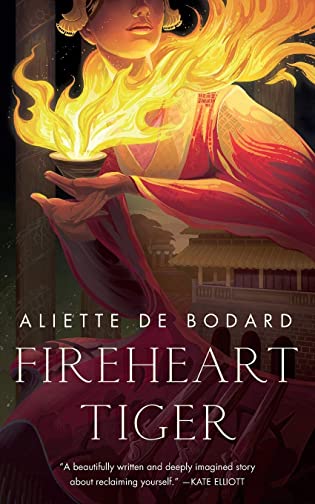 Fireheart Tiger by
Fireheart Tiger by 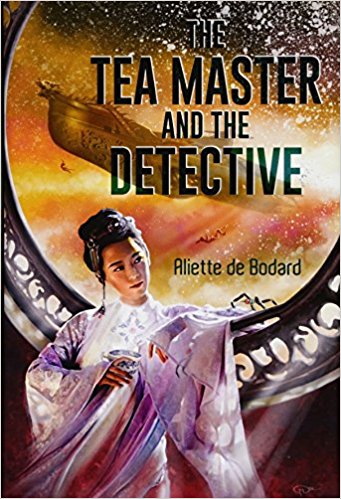 The Tea Master and the Detective (The Universe of Xuya) by
The Tea Master and the Detective (The Universe of Xuya) by